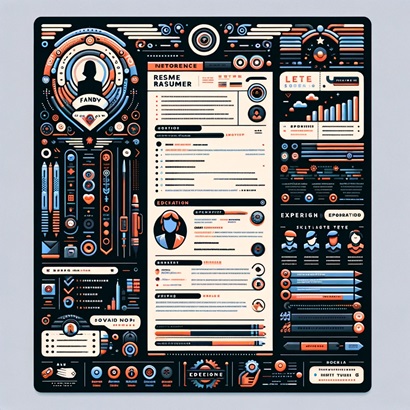Tailoring Your Resume for Specific Jobs: A Guide to Maximizing Job Matching
Resume Optimizer Pro Editorial Team
Updated April 14, 2025

As you may know by now, landing your dream job can be quite challenging. Employers often receive numerous applications for a single job opening, making it essential for candidates to stand out. In this digital age, job matching algorithms have become an integral part of the hiring process. These algorithms rely heavily on skills to find and match candidates to jobs. Studies have shown that integrating skills effectively in a resume can increase the chances of a candidate getting a callback by up to 50%.
The Role of Job Matching Algorithms
Job matching algorithms, often used by online job boards and recruitment platforms, are designed to connect job seekers with suitable job openings. These algorithms analyze various factors, such as skills, experience, education, and location, to identify the best fit for a particular job. Among these factors, skills play a pivotal role.
When employers post job openings, they usually specify the required skills and qualifications. Job matching algorithms compare these requirements with the information provided in candidates' resumes to determine the level of compatibility. Therefore, it's crucial for candidates to include relevant skills in their resumes, as this significantly impacts their chances of being matched with the right job.
The Importance of Skills in Your Resume
Skills are the building blocks of a resume. They demonstrate your qualifications and abilities, making them a critical component of job matching. Here's why skills are essential in tailoring your resume for specific jobs:
- Skills Highlight Your Qualifications When employers review resumes, they often skim through them quickly to identify qualified candidates. Including relevant skills prominently in your resume can immediately capture their attention. It shows that you possess the necessary qualifications for the job.
- Skills Provide Context In addition to listing your skills, it's essential to provide context within your work history. Mentioning where and how you've applied these skills in your previous roles adds depth to your qualifications. This context helps employers understand the extent of your experience and expertise.
- Skills Influence Job Matching As mentioned earlier, job matching algorithms heavily rely on skills. When your resume includes the skills required for a specific job, you increase your chances of being matched with that job. This initial match can get your foot in the door for an interview, making it a critical step in the hiring process.
- Skills Demonstrate Adaptability Adaptability is highly valued. Including a wide range of skills on your resume not only makes you more attractive to potential employers but also showcases your ability to learn and adapt to new challenges.
Showcasing Relevant Experience
Length of experience with certain skills tops the list of algorithmic priorities. When tailoring your resume, align your skills with those listed in the job description. Highlight your proficiency and the duration of your experience in these areas, using metrics and specific examples when possible. If the job emphasizes expertise in project management, detail your related achievements and quantify your results, such as "Led a team of 10 in delivering a complex project on time, under budget, by 15%."
Highlighting Job Titles
Next in line are job titles, which act as quick indicators of your professional level and area of expertise. ustomize your previous job titles to closely match those mentioned in the job posting, without straying from the truth. If you've worked as a "Senior Software Developer" and the job seeks a "Lead Software Engineer," it's reasonable to adjust your title to "Senior Software Engineer" if it accurately reflects your role and responsibilities.
Certifications and Education
Certifications and education further bolster your suitability for the job. If the position requires specific certifications, prominently display any that you possess. Similarly, align your educational background with the job's requirements. Suppose a role calls for advanced knowledge in data analysis, and you've completed relevant coursework or a certification, even if it's not part of your degree; make sure this is highlighted.
How to Tailor Your Resume for Specific Jobs
Now that we understand the significance of skills in job matching, let's explore how to tailor your resume effectively for specific jobs:- Research the Job Posting Before you start customizing your resume, carefully read the job posting. Pay close attention to the skills and qualifications required. These are the keywords that job matching algorithms will use to assess your suitability for the role.
- Identify Relevant Skills Compare the skills mentioned in the job posting with your own skillset. Highlight the skills you possess that align with the job requirements. These should be the skills you prominently feature in your resume.
- Incorporate Skills into Your Work History Don't just list your skills in a separate section; integrate them into your work history. Describe how you've used these skills in your previous roles. Use action verbs and specific examples to provide context and showcase your expertise.
- Be Honest and Transparent While it's essential to highlight your skills, it's equally important to be honest and transparent. Only include skills you genuinely possess and can demonstrate if asked during an interview. Misrepresenting your abilities can lead to problems down the line.
- Optimize Your Resume with Resume Optimizer Pro To assist you with tailoring your resume, use Resume Optimizer Pro to streamline the process. We will effectively target your resume with just a few clicks by allowing you to select the skills required by the job but not included in your resume. By doing so, you can quickly ensure that your resume matches the job posting's criteria.
Conclusion
Job matching algorithms have become a critical part of the hiring process. These algorithms heavily rely on skills to connect job seekers with the right job openings. To increase your chances of landing your dream job, it's essential to tailor your resume for specific jobs by highlighting relevant skills and providing context within your work history.
Resume Optimizer Pro is a valuable tool that simplifies the resume customization process. By allowing you to select the skills required by the job but not included in your resume, it streamlines the process of ensuring a perfect match between your qualifications and the job's requirements.


